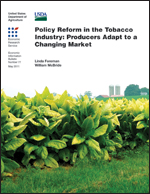Policy Reform in the Tobacco Industry: Producers Adapt to a Changing Market
- by Linda Foreman and William D. McBride
- 5/26/2011
Overview
The Fair and Equitable Tobacco Reform Act of 2004 eliminated tobacco quotas and tobacco price supports and allowed producers to plant any amount or type of tobacco regardless of geographic location. The authors found that flue-cured tobacco producers made greater adjustments to their operations after the buyout than did burley tobacco producers. Flue-cured tobacco producers were more likely to increase tobacco acres per farm, pushing up the tobacco acreage per farm at a faster rate compared with burley tobacco producers. Flue-cured producers also were more likely to invest in their tobacco enterprises and invested more per farm after 2004. As a result of increased acreage, tobacco operations became more sensitive to changes in labor costs. With over 75 percent of tobacco farms using hired or contract labor in 2008, the availability and cost of workers have become increasingly important to tobacco producers. This report is based on data collected from the tobacco version of the 2008 Agricultural Resource Management Survey (ARMS), which focused on U.S. producers of burley and flue-cured tobacco in 2008 and how their tobacco operations have changed since 2000 and 2004.
Download
-
Entire report
Download PDF -
Report summary
Download PDF -
Download EIB77.zip
Download ZIP

